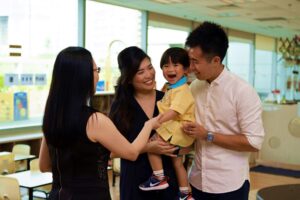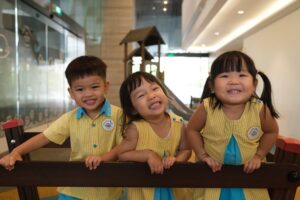BACK
Choosing the right preschool for your child is a big decision that can shape their early education experience. In Singapore, parents often find themselves choosing between private and government preschools.
Weighing these two options can help you make an informed choice that best suits your child’s needs. In this article, we discuss private and government preschools and what sets them apart.
Ownership and management
Government preschools
Government preschools in Singapore are owned and managed by government agencies or government-linked organisations such as the Ministry of Education (MOE) Kindergartens and the Early Childhood Development Agency (ECDA) funded centres. These institutions follow government guidelines designed to provide affordable and accessible early childhood education to the masses.
Private preschools
On the other hand, private preschools and international preschools are owned and managed by private entities, including individuals, companies and organisations. They have the flexibility to create their own policies and management practices, which can lead to a diverse range of educational philosophies and teaching methodologies.
Funding
Government preschools
Government preschools receive substantial funding. The funding helps to keep fees affordable for parents and ensures that essential resources and facilities are provided. The goal is to make quality preschool education accessible to all children, regardless of their family’s socioeconomic status.
Private preschools
Private preschools rely primarily on tuition fees paid by parents and any additional funding they may secure from private sources. This type of funding means private preschools may charge higher fees than government preschools.
However, the higher fees can translate into better facilities, more extracurricular activities, and a lower teacher-to-student ratio.
Curriculum
Government preschools
The curriculum in government preschools is typically standardised and aligned with Singapore’s national education goals. For example, MOE Kindergartens follow a curriculum framework focusing on holistic development, including literacy, numeracy, social skills, and physical development. The framework ensures that all children receive a consistent and comprehensive early education.
Private preschools
Private preschools can design their curriculum, making for a wide variety between schools. Some private preschools in Singapore may adopt internationally recognised educational philosophies such as Montessori, Reggio Emilia, or Waldorf. Others may offer specialised programmes focusing on language immersion and arts.
Parents can choose a preschool that aligns with their educational preferences and their child’s interests.
Regulations
Government preschools
Government preschools are subject to strict regulations and oversight by government bodies. The regulations cover various aspects of preschool operations, including teacher qualifications, curriculum standards, safety protocols, and facility requirements.
Rigorous oversight ensures a certain level of quality and consistency across government preschools.
Private preschools
While private preschools must also adhere to basic regulatory standards set by the ECDA, they generally have more operational autonomy, allowing them to innovate and implement unique teaching methods and programs.
However, it also means that different private preschools’ quality and standards can differ.
Accessibility
Government preschools
Government preschools aim to provide affordable and accessible education to all children. They are often located in residential areas to cater to the local community. Additionally, government preschools may offer financial assistance and subsidies to low-income families, further enhancing accessibility.
Private preschools
Private preschools may be less accessible to some families due to higher tuition fees. However, many private preschools still offer scholarships or financial aid.
Teacher qualifications and training
Government preschools
Teachers in Singapore’s government preschools must meet specific qualifications and undergo regular professional development to ensure they are well-trained and equipped with the latest pedagogical knowledge. Government preschools often have structured training programs and career progression pathways for their teachers.
Private preschools
Teacher qualifications in private preschools can vary. Some private preschools may have stringent hiring criteria and invest heavily in professional development for their staff, while others may have more relaxed standards. However, by choosing a reputable school, parents can be assured of quality education.
Which to choose?
Choosing between a private and government preschool depends on your child’s needs, educational preferences, and financial situation. Here are some considerations to help you decide:
- Budget: Government preschools are generally more affordable, making them a viable option for families with budget constraints. While more expensive, private preschools may offer additional resources and specialised programs.
- Curriculum preferences: If you have a specific educational philosophy or program in mind, such as Montessori or language immersion, you may find more options among private preschools.
- Location: Proximity to your home or office can be a deciding factor. Government preschools are often more widely distributed across Singapore but, over the years, private preschools have spread out quite a lot, too.
- Class size and teacher attention: Private preschools may offer smaller class sizes and a lower teacher-to-student ratio, which can mean more individualised attention for your child.
- Facilities and extracurricular activities: Private preschools may have more advanced facilities and a broader range of extracurricular activities, enhancing your child’s learning experience.
Enrol in Little Skool-House Private Preschool
Understanding the differences between private and government preschools can help you make a decision that aligns with your family’s needs and values.
If you are leaning towards a private preschool, consider enrolling your child in Little Skool-House. We are known for our commitment to providing a nurturing and stimulating learning environment. Little Skool-House offers a well-rounded curriculum, giving equal emphasis to academic excellence, character development and creative expression.
The teachers at Little Skool-House are highly qualified and undergo regular professional development to ensure they are equipped with the latest teaching strategies. Furthermore, our small teacher-to-student ratio ensures that each child receives personalised attention and support.
ENROL TODAY
ENROL TODAY



